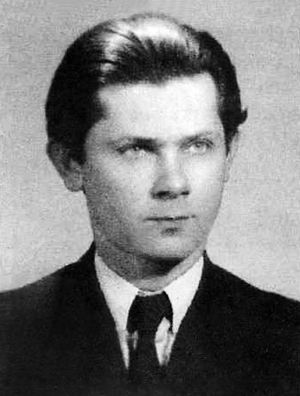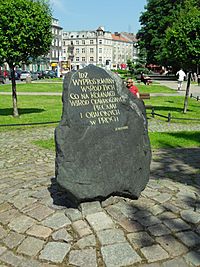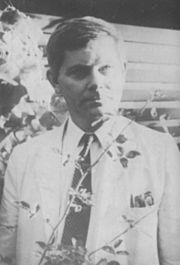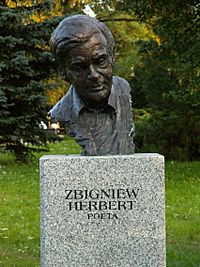Zbigniew Herbert facts for kids
Quick facts for kids
Zbigniew Herbert
|
|
|---|---|

Zbigniew Herbert
|
|
| Born | 29 October 1924 Lwów, Poland |
| Died | 28 July 1998 (aged 73) Warsaw, Poland |
| Resting place | Powązki Cemetery |
| Occupation | Poet, essayist |
| Language | Polish, German |
| Nationality | Polish |
| Notable awards | Austrian State Prize for European Literature 1965 Herder Prize 1973 Jerusalem Prize 1991 Vilenica Prize 1991 Order of the White Eagle 2007 |
| Spouse |
Katarzyna Dzieduszycka
(m. 1968) |
Zbigniew Herbert (born October 29, 1924 – died July 28, 1998) was a famous Polish poet, essay writer, and playwright. He is known as one of the most important Polish writers after World War II. His books have been translated into 38 languages.
Herbert was also a moralist, meaning he thought deeply about right and wrong. He was a strong voice against the communism that ruled Poland for many years. He often published his works in secret newspapers to avoid government control.
In 2008, the Polish government declared it the "Year of Zbigniew Herbert" to honor him. An international award for writers, the Zbigniew Herbert International Literary Award, was also created in his name in 2013.
Contents
Life Story
Early Years (1924–1956)
Zbigniew Herbert was born in Lwów, which was part of Poland then. His father, Bolesław, was a lawyer and a bank manager. His grandfather taught English.
During World War II, when Lwów was occupied by Germany and the Soviet Union, Herbert continued his studies in secret. He even graduated from high school this way in 1944. He also joined the Polish underground resistance.
He worked different jobs during the war. He was a "feeder of lice" at an institute that made vaccines against typhus. He also sold metal items.
After the war, Lwów became a Ukrainian city, and many Polish people had to leave. Herbert moved to Kraków and later to Sopot. He studied economics and law, earning a master's degree in law.
He tried to make a living as a writer. However, he refused to write propaganda for the communist government. This made it hard for his work to be published openly. He used pen names for some of his early reviews.
He also worked odd jobs, like being a blood donor and a timekeeper.
Traveling and Writing (1956–1981)

In 1956, the strict rules of Stalinism in Poland began to ease. This allowed Herbert to publish his first book of poems, Chord of Light.
Herbert loved Poland but disliked the communist government. He traveled a lot to see the "better world" outside. He wrote about his travels in his essay collection The Barbarian in the Garden (1962). He believed traveling helped him understand "the world beautiful and of such variety."
He visited France, England, Italy, and Greece. These trips were often on a tight budget. He also visited the United States, giving talks at universities. His works were translated into English, making him popular there.
Herbert became a member of important art academies in Germany. He married Katarzyna Dzieduszycka in 1968.
Back in Poland, he supported actions for democracy. He signed letters protesting against censorship and changes to the Polish constitution. These changes would have declared Poland's eternal loyalty to the Soviet Union.
Later Years (1981–1998)
In 1981, Herbert returned to Poland during a time when the independent trade union Solidarity was legal. He joined the team of an underground newspaper.
During martial law in Poland, he openly supported the opposition. His poems became symbols of freedom and resistance for young people.
In 1986, Herbert moved to Paris. He continued to write and became a member of the American Academy of Arts and Letters. In 1991, he received the Jerusalem Prize in Israel.
He returned to Warsaw in 1992, already very ill. In his later years, he spoke out strongly against former communists. He also supported the Chechen leader Dzjochar Dudajev and helped raise money for Chechnya.
Zbigniew Herbert died on July 28, 1998, in Warsaw. He was buried in Powązki Cemetery. He was awarded the Order of the White Eagle, Poland's highest honor, after his death.
His Writings
Poetry
Herbert's first poems were published without his permission in 1950. His true debut was in 1955, and his first book, Struna światła (Chord of Light), came out in 1956.
He created a famous character called Pan Cogito (Mr. Cogito) in his 1974 book of poems. Mr. Cogito often appeared in Herbert's later works. This character allowed Herbert to explore ideas using humor and different viewpoints.
Herbert's poems often use stories from mythology, medieval times, and art. He would look at these old stories in new ways. He believed the past helps us understand the present.
He thought that history often shows how evil can spread. But he also believed that people should always resist evil, even if it seems hopeless. He knew that in modern times, being a hero might seem silly, but it was still important to stand up for what is right.
Herbert's poetry also explores the idea of good and evil, and the meaning of life. He valued small, real things over big, abstract ideas. He believed our senses, especially touch, help us understand the world.
Poetic Style
Herbert's poems focused on human dignity and how people fit into history. He often used ideas and images from Mediterranean culture. He liked his poems to be clear and easy to understand.
Essays
Herbert's essays are like journeys through history and art. His book Barbarzyńca w ogrodzie (Barbarian in the Garden) describes his travels. He wrote about places like the Lascaux caves, ancient Greek and Roman sites, and Gothic cathedrals. He shared interesting facts and stories about these places.
Another essay collection, Martwa natura z wędzidłem (Still Life with a Bridle), is about 17th-century Dutch painting. He focused on less famous painters and how their art reflected their time.
His last essay book, Labirynt nad morzem (Labyrinth on the Sea-Shore), was published after his death. It mainly explores ancient Greek culture and history. Herbert often challenged common views of history, looking at events from different perspectives.
Dramas
Herbert wrote several plays, mostly between 1956 and 1961. Many of them were written as radio plays, using sounds and voices to create tension.
One of his most famous plays is Jaskinia filozofów (Cave of Philosophers). It is about the ancient Greek philosopher Socrates waiting for his death sentence. The play explores ideas about freedom and truth.
Other plays deal with everyday situations where evil appears. For example, Drugi pokój (The Other Room) shows how someone might wish for a neighbor's death just to get their room. These plays show how ordinary situations can reveal human flaws.
Awards and Honors
Zbigniew Herbert received many important awards for his writing:
- Kościelski Prize (1963)
- Jurzykowski Prize (1965)
- Austrian State Prize for European Literature (1965)
- Herder Prize (1973)
- Petrarca-Preis (1979)
- Solidarity Prize (1984)
- Jerusalem Prize for the Freedom of the Individual in Society (1991)
- Vilenica International Literary Prize (1991)
- Kazimierz Wyka Award (1993)
- The Ingersoll Foundation's T. S. Eliot Award for Creative Writing (1995)
Some historians believe the communist government in Poland tried to stop him from winning the Nobel Prize in Literature because of his anti-communist views.
Legacy
The Zbigniew Herbert International Literary Award was created in 2012 to honor his memory. This award celebrates living poets from around the world who write in any language.
Some famous poets who have received this award include W.S. Merwin and Charles Simic.
Images for kids
See also
 In Spanish: Zbigniew Herbert para niños
In Spanish: Zbigniew Herbert para niños
- Herbertiada
- List of Polish poets




